- Home
- Karen Hawkins
To Scotland, With Love Page 3
To Scotland, With Love Read online
Page 3
“That’s the third time you’ve suggested that my mother might be at death’s door.”
Blast it, why hadn’t he just told her that her mother was dying instead of simply ill? Venetia would have been much more malleable then—though perhaps not in the mood for a marriage proposal. “Your mother is quite delicate, so naturally I worry.”
“Mother? Delicate?”
Ravenscroft was not certain, but it sounded as though his beloved had accompanied that statement with a decided snort.
“Mother is as hardy as they come. Besides, none of that matters right now. Rap and tell the coachman to slow down.”
Ravenscroft eyed her sullenly.
Her hand went to her brooch. “Oh, very well! But I must say I think you’re overreacting.”
He rapped on the ceiling to alert the coachman, then leaned out the window to converse, the wind whipping away the sound of his voice.
Venetia shivered as the cold air entered the carriage. In her entire life, she could think of only one other time when it had snowed in April, and that had been because of Gregor.
Venetia frowned, again wondering if he had caused this weather. It was possible, but only if he lost his temper, which he rarely did. Besides his older brother, Alexander, Gregor was the MacLean most in control of his temper.
Surely the storm was a fluke. She turned her attention back to Ravenscroft, who seemed to be having some sort of altercation with the coachman. Finally, Ravenscroft withdrew into the carriage, tacking the leather curtain back in place, his face red from the wind.
“There. I did as you asked.”
There was a loud “Hie!” and then the carriage was off even faster than before, rocking wildly.
“You didn’t tell the coachman to slow down at all! You told him to go faster!” Venetia accused.
Ravenscroft was too busy trying to keep his seat to answer.
With a loud huff of frustration, Venetia raised herself and knocked hard on the roof of the carriage.
An answering knock was heard, and the coachman slowed the carriage, the rear wheels sliding back and forth before they regained control.
“Venetia! What are you doing?” Ravenscroft cried. “I am making certain we reach Grandmama’s house alive.”
“But we must go faster! We cannot creep along at this pace!” He banged his fist on the carriage roof.
There was a questioning knock in return, a hesitant tempo that made Venetia breathe a sigh of relief. “See? The coachman thinks it a poor idea. We should maintain this pace and—”
Ravenscroft banged heavily once again, louder and more forcefully. Instantly, the carriage sprang to a faster pace, throwing them both back into the seat. They rounded a curve in the narrow road, and the back of the carriage swung wildly for a moment before righting itself.
Venetia braced her feet on the edge of the seat across from her, struggling to remain upright. “You are mad! What on earth is wrong with you?”
Ravenscroft sank into his seat, his chin almost to his chest as he clung to the leather strap by the door. He looked pale and was perspiring, despite the cold.
Venetia refused to feel sorry for him. Maybe she could escape, toss herself out the door. She flipped back the leather curtain to see blinding snow whipping by. She could barely make out the outlines of trees and fences, a small inn, and a long stone wall before she refastened the curtain. She’d break her neck if she attempted to jump.
Which left her with Ravenscroft and his increasingly bizarre behavior. “Ravenscroft, please. Let’s just stop for a moment and get some hot tea and discuss this like adults who—”
The carriage swung to one side, careening madly before suddenly tilting up, then the whole world slid sideways. Venetia slammed into Ravenscroft, who rammed into the carriage door. They seemed to hang there, mashed against the latched door, until, with a loud snap, something broke—and then there was nothing but white and cold wind.
Gregor pressed a coin into the innkeeper’s rather grimy fist. “When did you see them?”
The innkeeper rolled the gold coin between his fleshy fingers, his heart beating a little faster at the sight. Suddenly, it didn’t seem like such an imposition to stand in the snow and talk. “ ’Twas an hour ago, no more.”
Gregor smiled grimly. He was catching up.
The innkeeper shook his head. “The carriage tore through here like the hounds of hell were after it. And in this snow, too. We all stared, we did, to see it slidin’ along at such a pace.”
“It didn’t stop?”
“Not here, though if I was a bettin’ man, I’d say they’d stopped at the White Swan in Tottingham. They’ve room to stable twice’t the horses I can.”
Gregor swung back up on his horse. “Thank you for the information, my good man.”
The innkeeper nodded, watching as Gregor wheeled his horse and rode down the road, far faster than was wise in this weather. There’d been a grim look to the man’s expression that had not boded well for the occupants of that carriage, and for a moment the innkeeper felt sorry for them. But the feel of the metal coin in his pocket soon turned his mind elsewhere, and, with a large smile, he entered his inn and called his wife to show her their good fortune.
Venetia found herself lying on her back, staring up into the swirling snow, the damp flakes tickling her lashes and cheeks. She was positively freezing, thanks to the snow that had been forced down her neck upon her impact with the ground. She gingerly moved her limbs, relieved when she felt only a dull throb in her head and a bit of an ache low in her back.
“Miss Oglivie?”
Venetia turned to find Ravenscroft digging snow from one of his ears. Behind him, she saw the lopsided carriage, half in the ditch, one wheel splintered into a thousand pieces. The door she and Ravenscroft had been thrown against was gone, the gaping doorway pushed full of muddy snow.
“Miss Oglivie—Venetia—are you injured? Did you—” Ravenscroft’s voice crackled with strain as he struggled through the snowdrift to her side.
Allowing him to assist her, she struggled to her feet. “I am fine, but the horses? How are they?”
Ravenscroft turned a gloomy face her way. “They’re as well as can be expected.”
“Aye,” said the groom, hobbling over. “They were fine until the bloke here made me spring ’em!”
Venetia’s impatience bubbled to the surface. “I agree. He should be shot for being in such a ridiculous hurry. Ravenscroft, see what your impatience has caused—” She caught sight of her companion and frowned. A thin trail of blood ran down his forehead and disappeared into the neck of his cravat. “You’re bleeding.”
Ravenscroft touched a hand to his forehead, pulled it away, and looked at the red drops. He gasped, his eyes rolled back into his head, and he fell into a dead faint, facedown in the snow.
Venetia looked at him with disgust. “Lovely. We’ve a broken carriage and a broken Ravenscroft.” She glanced at the coachman. “We should at least turn him over so he can breathe.”
“If ye say so, miss,” the coachman said grudgingly, helping her do so.
The swirling snow was thickening even as they stood. “Unhitch one of the horses, please. I shall ride to the inn we passed not a mile back.”
The coachman gawked. “But ye’re a woman! And there’s no proper saddle!”
Venetia tucked her pelisse collar more securely about her throat. “I can handle a carriage horse, with or without a saddle. Come, we must hurry.”
“Very well, miss. If ye say so.” He started to turn to the horses, but then paused to look back at Ravenscroft. “Do ye think his lordship is dead?”
“Heavens, no! He’s just a—” Silly boy. Fool. Idiot. There weren’t words. “He will be fine. Stay with him until I return.”
Hearing the note of steel in Venetia’s voice, the coachman finally did as he’d been instructed, and Venetia was soon on her way to fetch help.
“Aye, we seen them.” The man rocked back on his heels, looking through the s
now at Gregor. “Raced past here about twenty minutes ago.”
Gregor fished a coin from his pocket. “They didn’t stop to change the horses?”
“No, though they should have. The leaders looked winded.” The groom handed the reins of a large bay mare to Gregor.
He climbed up on the newly saddled horse. “Take good care of my horse. I shall return for him in a day or so.”
“I will, guv’nor! See if I don’t.”
“Thank you. This bay looks to be a good one.”
“Heart o’ gold and strong as an ox. Not fast, but she’ll carry you through this weather without complaint.”
“Excellent.” Gregor tossed the coin to the groom, whose eyes widened when he realized it was gold.
“Thankee, m’lord!” But he spoke to the snow; Gregor was already pressing on, his head bent against the wind and snow, his jaw firm.
The groom patted Gregor’s exhausted mount. “I don’t know who he’s after, but I’m glad it ain’t me.”
The wind whipped Venetia’s pelisse and skirts and seeped through her gloves. The snow fell so heavily she could barely see the road now. Jacobs tossed his massive head, sending a shower of wet snow onto Venetia, who sputtered and wiped it from her face. If this weather was indeed caused by Gregor, then something was seriously amiss. He was her dearest friend. If something was wrong, she should be there for him. Another reason to find a swift way out of this mess, let alone her concern for her mother.
Papa had certainly made Mama’s case sound desperate. But then Papa made life sound desperate.
Venetia sometimes wished her family was a bit less dramatic. Thank goodness Gregor laughed at them frequently; it helped her keep her perspective.
She smiled slightly and patted Jacobs’s neck. “Gregor has a sharp wit. Unfortunately, it cuts as often as it tickles.” Not that she minded; she gave as good as she got. Besides, Gregor was good company. He was a bruising rider who could keep up with her in the field, had a sharp sense of humor that usually matched her own, and possessed a well-informed mind. Best of all, he didn’t force one to listen to inane conversation. If he had something to say, he said it. Otherwise, he was perfectly content with a peaceful silence now and then.
It didn’t hurt that he was also amazingly, painfully, incredibly handsome, even with that intriguing scar down his cheek and jaw. One of Venetia’s friends had once confessed that she’d dreamed of tracing that scar with her fingertips, kissing him as she did so—such silliness. An odd warmth flashed through her.
The faint outline of a building arose through the dim snow. Relieved, Venetia urged Jacobs on, and they soon trotted through the stone gate and into the yard. The two-story inn appeared snug, the fogged windows covered with white lace curtains, while welcoming clouds of smoke poured from every chimney.
Venetia swung down when she saw the hostler hurry from the stables, his eyes wide with surprise. In a remarkably short time, Venetia was standing inside the inn’s common room beside a warm fire, a cup of hot tea between her numbed hands, telling her story to the inn’s proprietors, Mr. and Mrs. Treadwell.
Venetia was glad to hear that there were two rooms available; a widow and her companion occupied the third guest chamber. No sooner had Venetia mentioned that their coach had overturned than Mr. Treadwell, a small, thickset man with a twinkle in his eyes, had bundled up and was on his way to the rescue, not pausing for details.
Mrs. Treadwell, a tall, angular woman with wiry gray hair that refused to be contained in a neat bun, instantly began to prattle about how nice it was to have so many guests under their humble roof. She eyed Venetia up and down, sizing up the cost of the ermine-lined pelisse and soft doeskin gloves. “My, ye must have come straight from London, to have such fine things!”
“Yes, we did. We’re—”
“We?”
“Yes, myself and—” Venetia blinked, suddenly realizing how awkward it might appear for her to be traveling alone with a single man. “My—ah—brother and I are traveling to my—our grandmother’s house.”
Mrs. Treadwell’s gaze cleared. “That’s nice, to be sure. Mr. Treadwell and I don’t believe in turning away anyone, especially in weather such as this, but we won’t support none of the elopers as use this road, neither.”
Venetia frowned. “Why would elopers use this road?”
“Law, child! Surely you’ve heard of Gretna Green? All the elopers wish to travel the North Road!”
“Of course I have heard of Gretna Green, but this isn’t—” Venetia’s gaze fell on the snow-covered road. They’d begun on the right road when they pulled out of London. But as it had grown colder, and she’d become more distracted by Ravenscroft’s odd behavior, she hadn’t looked out the window long enough to notice that the familiar landmarks that marked the road to Grandmama’s were not in sight. It was entirely possible that they had crossed over to the North Road. But why—
With an almost audible click, it fell into place. They weren’t going to Grandmama’s at all. Instead they were on the North Road, headed for Gretna Green. She was being abducted—and by Ravenscroft, of all people!
Venetia’s knees wobbled. Fortunately, there was a bench behind her, and as her knees buckled, she sat hard.
Mrs. Treadwell’s brows rose. “Miss! Are ye well?”
Venetia’s mouth opened, but no words came out. Her heart thudded thickly in her ears. A dull sickness tightened about her stomach.
“Ye look a mite pale. Are ye well?”
Venetia forced herself to find her voice. “I don’t know. I suddenly feel a bit dizzy.”
The innkeeper’s wife clicked her tongue sympathetically. “Ye’re pale as a ghost, miss—” She paused, her bright eyes fixed on Venetia. “I’m sorry. I didn’t hear your name?”
Venetia smiled thinly, rage surging though her. “I’m sorry, I should have introduced myself. I am Miss—” A name. I need a name. “West.” She continued quickly, “I am still quite chilled. Do you think I might have some more tea?”
“Oh, lawks! I’ll run and put on a fresh pot. I daresay yer brother will want a warm cuppa when he arrives, too.”
All Venetia wanted was to box Ravenscroft’s rather large ears, but she murmured agreement as her hostess left the room. The second the woman was gone, Venetia sprang to her feet and paced furiously. Blast it all, what was Ravenscroft thinking? She had no desire to wed, and he could hardly have thought to force her to. There were too many people who would rush to assist a woman who was screaming wildly, and scream she would.
Even Ravenscroft couldn’t be that foolish. She paced back and forth, more and more furious as the minutes passed. When a commotion arose out in the innyard, she flew to the window to see a rickety cart pull in. Mr. Treadwell, bundled until he appeared twice his size, rode in the front seat, with Ravenscroft wavering beside him. The hostler sat behind with the luggage, holding the reins of the limping carriage horse.
Venetia’s fingers curled into fists at the sight of Ravenscroft. She hurried to open the front door, only to find Mrs. Treadwell tramping down the hallway before her.
Mrs. Treadwell threw open the door just as Mr. Treadwell assisted Ravenscroft from the carriage. Ravenscroft’s legs folded as he climbed down from his seat, and it was fortunate Mr. Treadwell was there to catch him. Had it been Venetia, she wouldn’t have bothered.
“Bring the lad here!” Mrs. Treadwell ordered. Her husband obligingly lifted Ravenscroft to his feet and carried him in.
Mrs. Treadwell hurried to slam the door, closing out the frigid air. “Lord, the lad looks frozen through!” She readied a chair by the fire. “And his head! Lor’, that’s a nasty wound.”
Ravenscroft blanched, though his teeth clattered too much for him to reply.
Venetia whispered to Mrs. Treadwell, “Pray do not mention his wound; he has already fainted once for that very reason.”
“Oh!” she whispered back. “He’s one of those, is he?”
“Among other things, yes.”
M
rs. Treadwell’s lips twitched, but she only nodded.
Ravenscroft huddled before the fire, his teeth clacking. “C-c-c-cold!”
“Aye,” agreed Mr. Treadwell stoically. “Don’t think I’ve ever seen it this cold in April in all me days.”
Venetia forced herself to stop imagining her fingers around Ravenscroft’s thin throat. “The horses—how are they?”
Mr. Treadwell said, “A strained fetlock, ’tis all. My hostler is looking after that one now. Yer coachman is bringing t’other two.”
Ravenscroft shivered. “What a h-h-horrid experience!”
“Yes,” Venetia said shortly. “For all of us.” She turned to the innkeeper. “I know an excellent poultice for a strained fetlock. Do you have bran, barley, and some oats?”
The innkeeper beamed. “Aye! And some honey, too, if you are making the poultice I’m thinking of.”
She managed to smile in return. “Yes. I shall mix some up and—”
“Nonsense,” Mr. Treadwell said stoutly. “I’ll take care of the horses. You stay here with the young man—”
“Her brother,” Mrs. Treadwell interjected.
“Well, I’m glad to have ye both here, Miss—”
“West,” Venetia said, sending Ravenscroft a firm glance.
Ravenscroft blinked woozily. “But—”
“Oh, dear! You are quite muddled, aren’t you? I’m not surprised, being tossed from the carriage as we were. Mrs. Treadwell, do you have anything for his head?”
Mrs. Treadwell clicked her tongue. “Poor thing. The tea should be ready. I’ll make a nice chamomile head wrap, too, to help clear his thoughts.” She smiled kindly on him, then took Venetia’s arm and led her away to whisper in a low voice, “I’ll slip a bit of laudanum in yer brother’s tea. After he’s relaxed a bit, we’ll wrap up his noggin and get him fixed up right and well.”
Venetia nodded, though the only thing wrong with Ravenscroft’s noggin was that it was empty.
As Mrs. Treadwell whisked herself from the room, Mr. Treadwell tightened his muffler around his throat. “I’ll go see to the horses. Yer man should be here soon with the t’other two.” He paused to eye Ravenscroft. “Can ye take care of yer brother by yerself?”

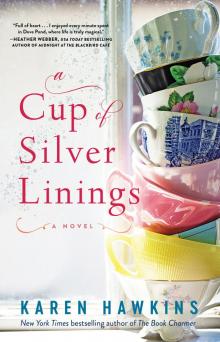 A Cup of Silver Linings
A Cup of Silver Linings The Book Charmer
The Book Charmer The Prince and I
The Prince and I![Duchess Diaries [2] How to Pursue a Princess Read online](http://i1.bookreadfree.com/i/03/12/duchess_diaries_[2]_how_to_pursue_a_princess_preview.jpg) Duchess Diaries [2] How to Pursue a Princess
Duchess Diaries [2] How to Pursue a Princess To Scotland, With Love
To Scotland, With Love Her Master and Commander
Her Master and Commander A Belated Bride
A Belated Bride 1794_Charlotte
1794_Charlotte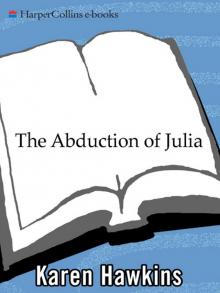 The Abduction of Julia
The Abduction of Julia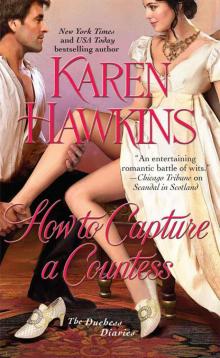 How to Capture a Countess (Duchess Diaries 1)
How to Capture a Countess (Duchess Diaries 1)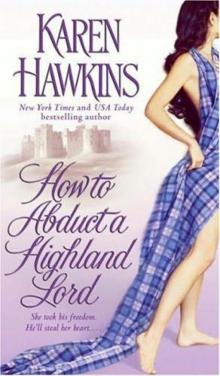 Karen Hawkins - MacLean 1 How to Abduct a Highland Lord
Karen Hawkins - MacLean 1 How to Abduct a Highland Lord The Princess Wore Plaid
The Princess Wore Plaid How to Abduct a Highland Lord
How to Abduct a Highland Lord THE LEGEND OF NIMWAY HALL: 1794 - CHARLOTTE
THE LEGEND OF NIMWAY HALL: 1794 - CHARLOTTE Caught by the Scot
Caught by the Scot The Lady in the Tower
The Lady in the Tower Her Officer and Gentleman
Her Officer and Gentleman Hurst 02 - Scandal in Scotland
Hurst 02 - Scandal in Scotland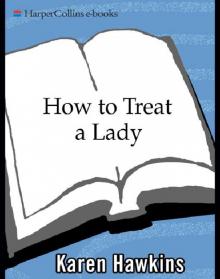 How to Treat a Lady
How to Treat a Lady An Affair to Remember
An Affair to Remember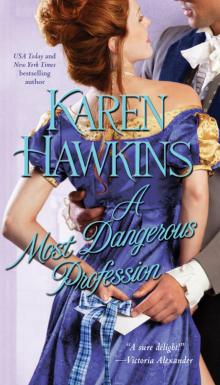 A Most Dangerous Profession
A Most Dangerous Profession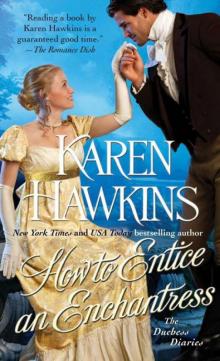 How to Entice an Enchantress
How to Entice an Enchantress The MacLeans: Sleepless in Scotland
The MacLeans: Sleepless in Scotland Confessions of a Scoundrel
Confessions of a Scoundrel Lois Lane Tells All
Lois Lane Tells All The Prince Who Loved Me (The Oxenburg Princes)
The Prince Who Loved Me (The Oxenburg Princes) The Seduction of Sara
The Seduction of Sara The Laird Who Loved Me
The Laird Who Loved Me The MacLeans - Sleepless in Scotla
The MacLeans - Sleepless in Scotla And the Bride Wore Plaid
And the Bride Wore Plaid THE LEGEND OF NIMWAY HALL_1794_CHARLOTTE
THE LEGEND OF NIMWAY HALL_1794_CHARLOTTE Princess in Disguise
Princess in Disguise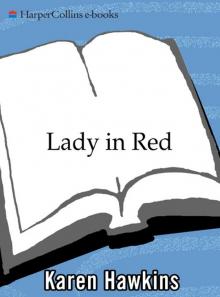 Lady in Red
Lady in Red Much Ado About Marriage
Much Ado About Marriage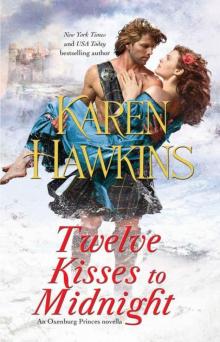 Twelve Kisses to Midnight: A Novella (The Oxenburg Princes)
Twelve Kisses to Midnight: A Novella (The Oxenburg Princes) Mad for the Plaid
Mad for the Plaid An Encounter at Hyde Park
An Encounter at Hyde Park